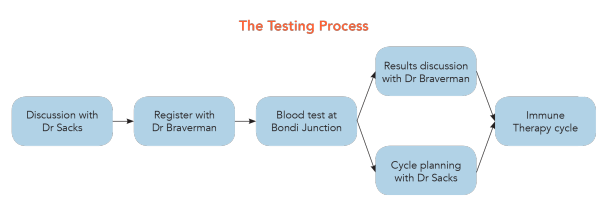Reproductive Immunology
In collaboration with Braverman Reproductive Immunology
Advanced Reproductive Immunology Testing
Advanced reproductive immunology testing involves blood tests taken from both female and male partners. Under carefully controlled conditions, the samples are rapidly transported overseas to a specialised laboratory in Boston, USA (Reprosource). The samples are analysed and results presented to Dr Braverman’s Reproductive Immunology team in New York, USA. Their detailed interpretation is sent back to Dr Sacks in Australia for guidance in planning immune therapy for IVF cycles or pregnancy management.
Collaboration with specialists in the USA
Complex immune testing has, until recently, been confined to research studies. Few laboratories in the world are able to perform the tests, and particularly are able to provide reliable results with appropriate reference ranges. But in the last 5 years, Dr Jeff Braverman in New York has developed an extensive panel of tests in collaboration with specialist Reprosource Lab in Boston.
The panel of tests, now one of the most comprehensive range of tests for patients with repeated reproductive failure anywhere in the world, has been used extensively and treatment outcomes appear to be significantly better than expected.
In scientific terms, these are still pioneering times and such interventions are not yet proven. As such, they should be considered with caution. But the approach represents the most advanced scientifically based attempt to improve implantation success rates in women with repeated IVF failure or miscarriage.
A major hurdle for Australian patients in accessing this kind of investigation is that there is no lab like Reprosource in Australia. The complexity of these tests means that there is unlikely to ever be more than a few such specialised centres in the world. So the only option is to send blood samples directly to Reprosource. This is a significant issue because fresh blood samples are not stable and are particularly affected by changes in temperature and time in transit.
A new company in Australia – Reprosearch – has worked closely with Reprosource to set up a suitable system, using highly specialised containers and arrangements for rapid transport. Lab results are sent directly to Dr Braverman for analysis and interpretation, and a clinical management plan is made in collaboration with Dr Sacks. The panel of immune tests is still evolving as more analysis is done and knowledge is required.
Some of the tests include:
- KIR haplotype
- HLA matching
- Cytokines (including TNFa, IL10, IL17, ILA, IFNg, IL8, IL6, IL15, IL12, MCP-1) tested in serum and intracellularly in T cells and NK cells
- NK cell cytotoxic activity
- T and B cell analysis
- Extensive antibody testing including cardiolopin, thyroid, antinuclear
- Complement
What happens once the results are analysed?
Dr Braverman himself will discuss the results and suggestions with each patient. They will then see Dr Sacks to make the plan here in Australia.
Therapies that could be recommended include:
- clexane
- prednisolone
- intralipid
- immunoglobulin
- G-CSF
- Anti-TNFa
- metformin
- Other supplements
Each patient receives an individualised protocol based on their immune profile. The protocol is applied to their specific conception plan, whether it involves natural conception, IVF, frozen embryo transfer or the use of donor eggs or sperm.

Background
Many have benefited from the ‘Bondi protocol’ therapy for high NK cell activity – a simple, safe and inexpensive approach to possible immune overactivity associated with embryo implantation failure.
But NK testing does not help everyone. Studies from Sydney has identified 15-25% of women with repeated failure to have high NK cell activity. What about the others? Are they simply unlucky to have had many poor embryos? Or are there other more subtle abnormalities of the immune system?
The immune system is a network involving many kinds of white blood cells (such as NK cells, T cells, B cells, monocytes), and their protein signals called cytokines (such as TNF-alpha, interferon-gamma, and a large number of interleukins), spread over different sites in the body (such as the bloodstream and the womb).
Dr Sacks’ PhD research, still extensively quoted, showed that the interaction between the embryo and the mother’s immune system is an important part of normal pregnancy. Indeed, it is now acknowledged that the immune system is probably an essential part of the communication between the mother and embryo to enable all the complex changes necessary to establish a pregnancy.
In other words, therapies that are aimed at modulating the immune system (immune therapies) need to be applied carefully and appropriately. Rather than simply trying ‘more and more’, more benefit is likely from a more accurate diagnosis.
Dr Sacks is a clinical director of IVFAustralia.
